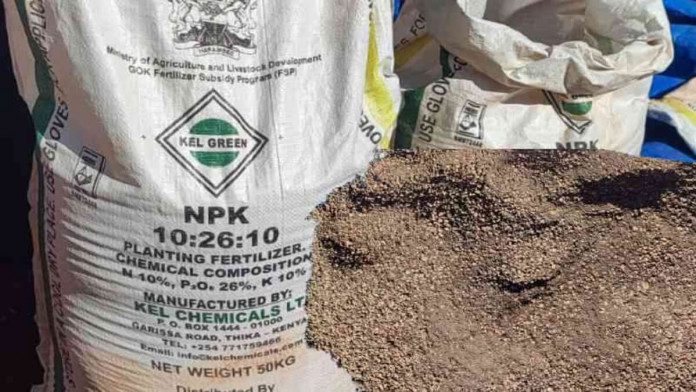News in Brief:
– Kenya’s agricultural sector is in crisis after fake fertiliser was allegedly distributed to farmers through government channels.
– This substandard product could significantly reduce maize production and worsen food insecurity which already affects over 1.6 million Kenyans.
Kenya’s agricultural sector has been hit by a scandal involving the alleged distribution of counterfeit subsidised fertiliser to farmers. The Kenya Bureau of Standards (KEBS) confirmed the presence of fake GPC Plus Organics fertiliser in 25kg bags circulating in the market.
KEBS Managing Director, Esther Ngari, revealed that the counterfeit fertiliser was sold by the National Cereals and Produce Board (NCPB) during the planting season. Although the fertiliser was packaged in government bags, it lacked the crucial KEBS seal of approval.
Also, Ngari estimates that farmers have unknowingly purchased the substandard fertiliser for months. She warned that the product is unfit for agricultural use.
KEBS has reportedly seized 5,840 bags of the counterfeit fertiliser nationwide.
Kenyan government response to fake subsidise fertilisers and blame game
Agriculture Minister Mithika Linturi pledged a thorough investigation and legal action against any public officials found culpable. However, he downplayed the issue, assuring farmers that most subsidised fertilisers are genuine while accusing the opposition of politicising the matter to incite public outrage.
However, this accusation has been met with heavy criticism. The opposition coalition has called for Linturi’s resignation, alleging economic sabotage due to the fake fertiliser distribution. Kalonzo Musyoka, leader of the Wiper party, slammed the government for failing to support farmers and instead selling them ‘poison.’
Maize farmers, particularly in North Rift and Western regions, fear the fake fertiliser could lead to a significant drop in maize production, potentially exacerbating food insecurity in Kenya. This concern is particularly serious given the existing food scarcity faced by over 1.6 million Kenyans, primarily in drought-stricken areas, as reported by the World Food Programme in 2023.
Agricultural pressure groups warn that the situation could worsen if the circulation of fake fertiliser isn’t addressed immediately. Statistics from Route to Food indicate that at least a quarter of Kenya’s population, exceeding 13 million people, already lack reliable access to food.



